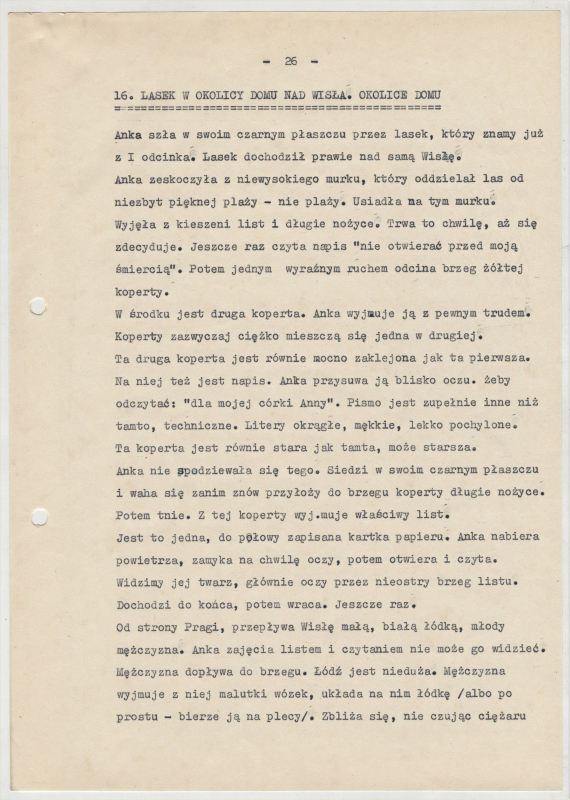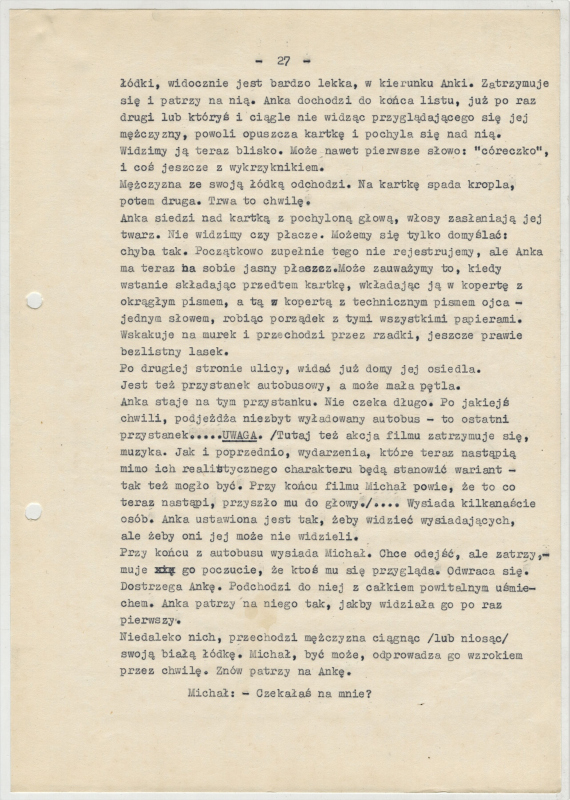Vistula
The left (west) bank of the Vistula—seen in Decalogue Four from Ania’s vantage point on the right bank—is largely developed and lined with concrete. The river’s east bank has mostly retained its natural form.
Decalogue Four
Anna (Adrianna Biedrzyńska) pulls out an enveloped marked “Open after my death.” The only witness to her furtive actions is the mysterious man (Artur Barciś) paddling a kayak over from the opposite bank. This scene’s silent witness (whose presence is observed in other episodes) resembles Charon, the mythological ferryman who carried the souls of the dead across the Styx. He seems to remind us that Ania will only gain the right to open the mysterious envelope after the death of her dad; by disobeying her mother’s wishes, she goes against the will of her still-living father (Janusz Gajos) and violates a taboo. However, we learn from the film that the girl does not actually open the second envelope, one that might contain a difficult truth about her ancestry. Her attempt to provoke her father by claiming to have read the letter despite her mother’s request succeeds in part because Ania is a trained actress. It’s possible that the idea of writing a false letter occurred to her during a rehearsal at theater school, where her teacher, Adam Hanuszkiewicz (a well-known actor and theater director) whispered into her ear the final words from Adam Mickiewicz’s poem “Good Night.” Perhaps he reminded her, at that moment, of her father, who used to sing her lullabies as she drifted off to sleep. In one of the early drafts of the screenplay, another famous actor, Tadeusz Łomnicki, is cast in the role of the acting teacher, while the students rehearse a scene from William Shakespeare’s Romeo and Julia instead of poetry by the famous Polish bard.
Mikołaj Jazdon
The Fourth Commandment:
Honor your father and your mother.
“The father is always uncertain?”
In this film Kieślowski probes the mystery of fatherhood. If we take it to mean a purely biological relationship, the film depicts the turbulent emotions and pain caused by the problem indicated by the Ancient Roman saying Pater semper incertus (“The father is always uncertain”); on the other hand, Decalogue Seven echoes the biblical warning against perceiving motherhood in purely biological terms. The Bible depicts a father and mother’s great mission not as a biological function, but a moral calling to provide for their children’s happiness and growth.
And what about the children’s duties? In the original Hebrew text of the sixth commandment, the word for “honor” signifies something mysterious, of the greatest importance, including God, as well as our deference to such people or things. This kind of honor—praise, an untouchable secret, according to the commandment—is what parents deserve from their children. The Daughter in the film is tempted to violate this secret; both secrets, in fact: the separate secrets of the Mother and Father. The latter never violates his wife’s secret. The secrets are anxiously guarded by the Angel Barciś, who rushes down the river in his boat, as if sent from the world beyond to prevent the Daughter from breaking a taboo. Like a divine sword, his weird white boat cuts through the scene and our own confusion.
There appears, in the context of filial piety, a sacred and untouchable “oedipal” period: little boys want to marry their mothers, while girls want to marry their daddies. The Daughter in the film is an adult, yet we see that she only achieves emotional maturity when she realizes that, by treating her father as a man, she risks losing him. She rebuilds her relationship with him in the final scenes, and then both reverentially put away the untouchable secret forever.
But there remains, somewhere, the terrible obverse of this secret: had the Father stepped out of his sacred role, just for a moment, and abused his child’s love, everything would have collapsed.

